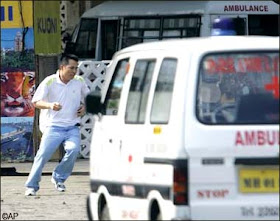
A suspected terrorist is seen with a rifle outside the Chatrapati Shivaj Terminal railway station in Mumbai, India, Thursday, Nov. 27, 2008. Teams of heavily armed gunmen stormed luxury hotels, a popular restaurant, hospitals and a crowded train station in coordinated attacks across India's financial capital Wednesday night, killing at least 82 people and taking Westerners hostage, police said. A previously unknown group, apparently Muslim militants, took responsibility for the attacks
STORY SO FAR
Gun battles at the Taj Hotel on south Mumbai seafront where army battalions have stormed in trying to rescue hostages held by the terrorists in various parts of the building. Media reports says that some foreign tourists are held hostage at the Trident Hotel by suspected terrorists. At least 101 people including 11 policemen and four terrorists have been killed and about 200 people suffered injuries in the Night of Terror. There are 7 foreigners among 15 taken hostage in Taj Hotel. US president-elect Barack Obama joined the American government in strongly condemning Wednesday's series of "horrific attacks" in Mumbai and asked Washington to work with India to root out and destroy terrorist networks worldwide.

A chef of Taj Mahal Hotel runs to safety after being rescued by security agencies in Mumbai, India, Thursday, Nov. 27, 2008. Teams of gunmen stormed luxury hotels, a popular restaurant, a crowded train station and a Jewish group's headquarters, killing people, and holding Westerners hostage in coordinated attacks on the nation's commercial center that were blamed on Muslim militants.
A grieving relative, bottom, of a terrorist attack victim is consoled by others outside the St. Georges Hospital in Mumbai, India, Thursday, Nov. 27, 2008. Teams of gunmen stormed luxury hotels, a popular restaurant, hospitals and a crowded train station in coordinated attacks across India's financial capital, killing at least 101 people, taking Westerners hostage and leaving parts of the city under siege Thursday, police said. A group of suspected Muslim militants claimed responsibility.


An Indian Army soldier takes position outside the Taj Mahal hotel in Mumbai, India, Thursday, Nov. 27, 2008. Teams of gunmen stormed luxury hotels, a popular restaurant, a crowded train station and a Jewish group's headquarters, killing people, and holding Westerners hostage in coordinated attacks on the nation's commercial center that were blamed on Muslim militants.

A usually crowded underpass that leads to the Chattrapati Shivaji Terminus train station is deserted in Mumbai, India, Thursday, Nov. 27, 2008. Teams of gunmen stormed luxury hotels, a popular restaurant, a crowded train station and a Jewish group's headquarters, killing people, and holding Westerners hostage in coordinated attacks on the nation's commercial center that were blamed on Muslim militants.

A police officer watches the Taj Hotel, Mumbai's landmark hotel, after an attack in Mumbai, India's financial capital, on Wednesday night November 26, 2008. Teams of heavily armed gunmen stormed luxury hotels, a popular restaurant, hospitals and a crowded train station in coordinated attacks across India's financial capital Wednesday night, killing at least 78 people and taking Westerners hostage, police said.



The Taj Hotel, Mumbai's landmark hotel, is caught fire after an attack in Mumbai, India's financial capital, on early Thursday morning November 27, 2008. Teams of heavily armed gunmen stormed luxury hotels, a popular restaurant, hospitals and a crowded train station in coordinated attacks across India's financial capital Wednesday night, killing at least 78 people and taking Westerners hostage, police said.

The Taj Hotel, Mumbai's landmark hotel, is caught fire after an attack in Mumbai, India's financial capital, on early Thursday morning November 27, 2008. Teams of heavily armed gunmen stormed luxury hotels, a popular restaurant, hospitals and a crowded train station in coordinated attacks across India's financial capital Wednesday night, killing at least 78 people and taking Westerners hostage, police said.

Army soldiers take position outside the Taj Hotel, Mumbai's landmark hotel, after an terror attack in Mumbai on Wednesday night November 26, 2008. Teams of heavily armed gunmen stormed luxury hotels, a popular restaurant, hospitals and a crowded train station in coordinated attacks across India's financial capital Wednesday night, killing at least 78 people and taking Westerners hostage, police said.


Fire engulfs a part of the Taj Mahal Hotel as firemen try to douse it in Mumbai, India, on early Thursday, Nov. 27, 2008. Teams of heavily armed gunmen stormed luxury hotels, a popular restaurant, hospitals and a crowded train station in coordinated attacks across India's financial capital Wednesday night, killing at least 78 people and taking Westerners hostage, police said. A previously unknown group, apparently Muslim militants, took responsibility for the attacks.


Guests and hotel staff are being rescued by a firefighter at the Taj Hotel in Mumbai, India, Thursday, Nov. 27, 2008. Teams of heavily armed gunmen stormed luxury hotels, a popular restaurant, hospitals and a crowded train station in coordinated attacks across India's financial capital Wednesday night, killing at least 78 people and taking Westerners hostage, police said.



Firefighters inspect the site of an explosion in Mumbai, India, Wednesday, Nov. 26, 2008. Gunmen targeted luxury hotels, a popular tourist attraction and a crowded train station in at least seven attacks in India's financial capital Wednesday, wounding 25 people, police and witnesses said. A.N Roy police commissioner of Maharashtra state, of which Mumbai is the capital, said several people had been wounded in the attacks and police were battling the gunmen. "The terrorists have used automatic weapons and in some places grenades have been lobbed," said Roy. Gunmen opened fire on two of the city's best known Luxury hotels, the Taj Mahal and the Oberoi. They also attacked the crowded Chhatrapati Shivaji Terminus station in southern Mumbai and Leopold's restaurant, a Mumbai landmark. It was not immediately clear what the motive was for the attacks.
Unidentified guests of the Taj Hotel are seen outside hotel in Mumbai, India




















